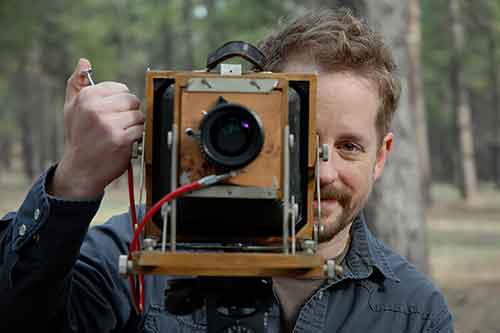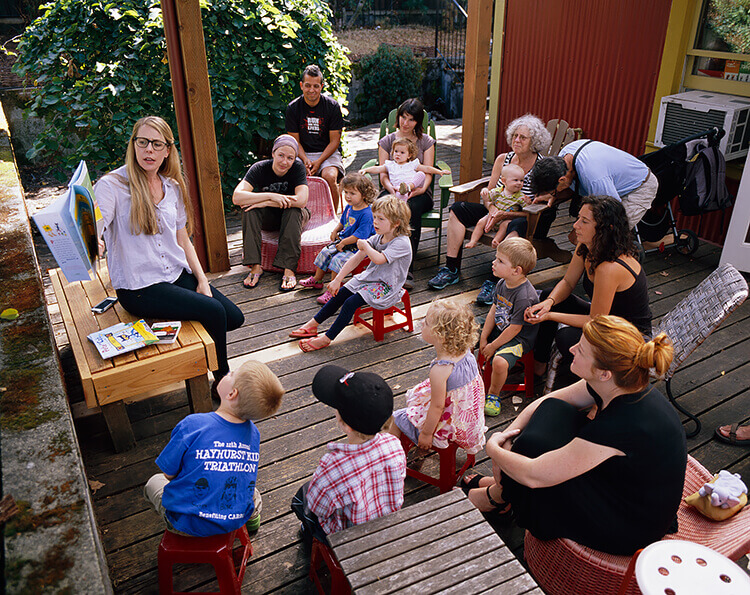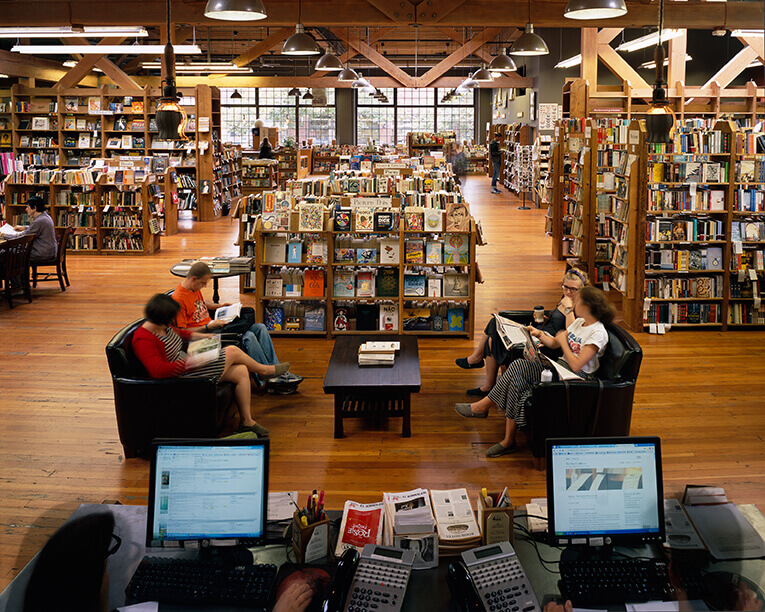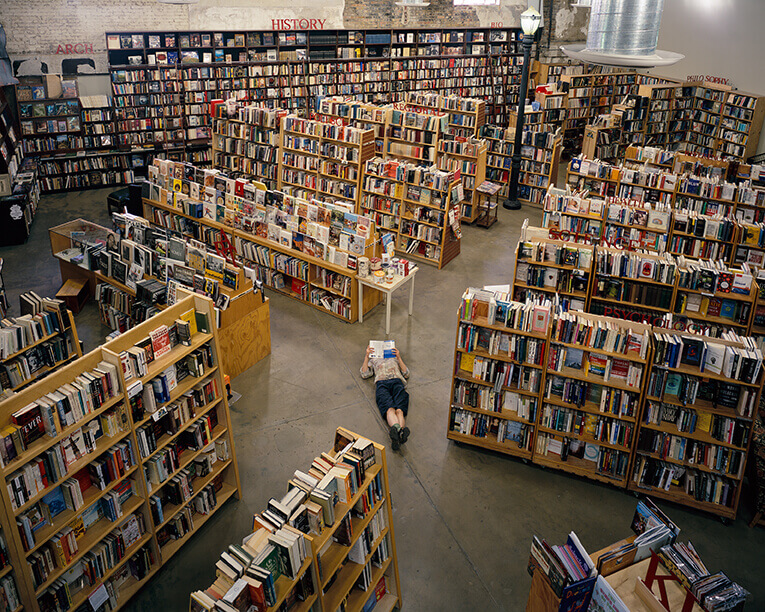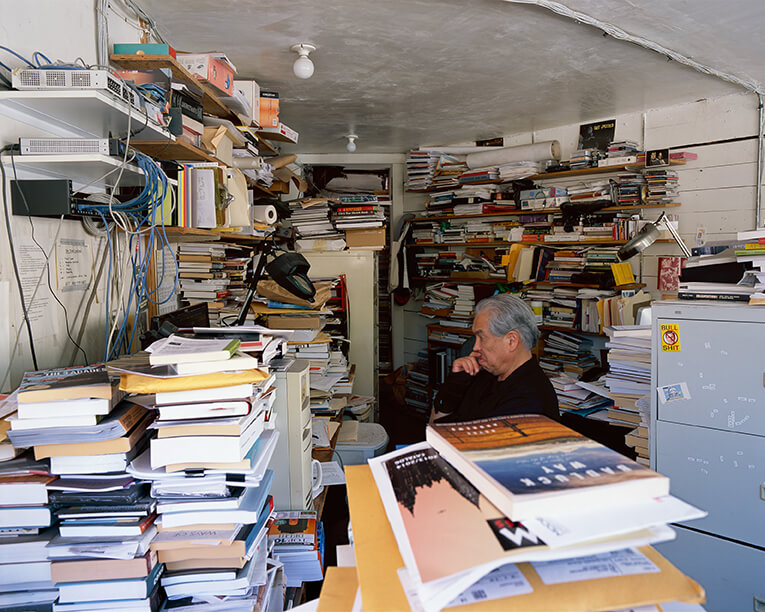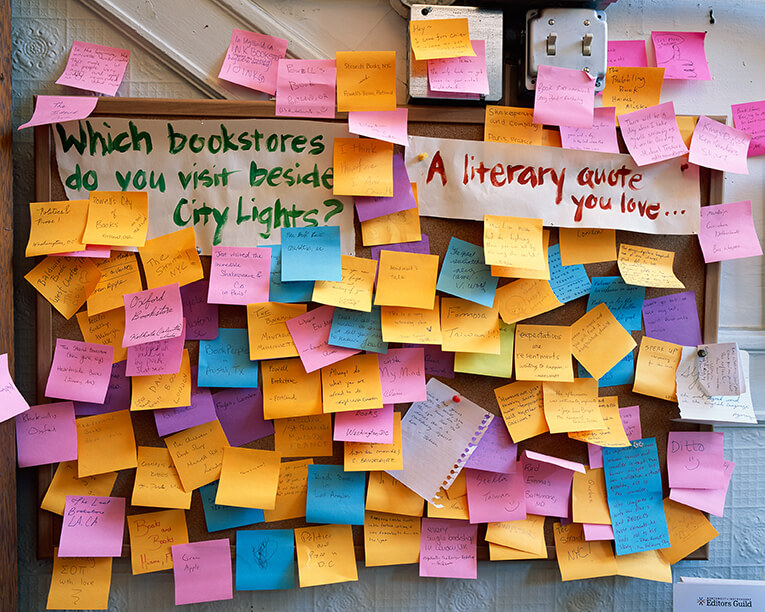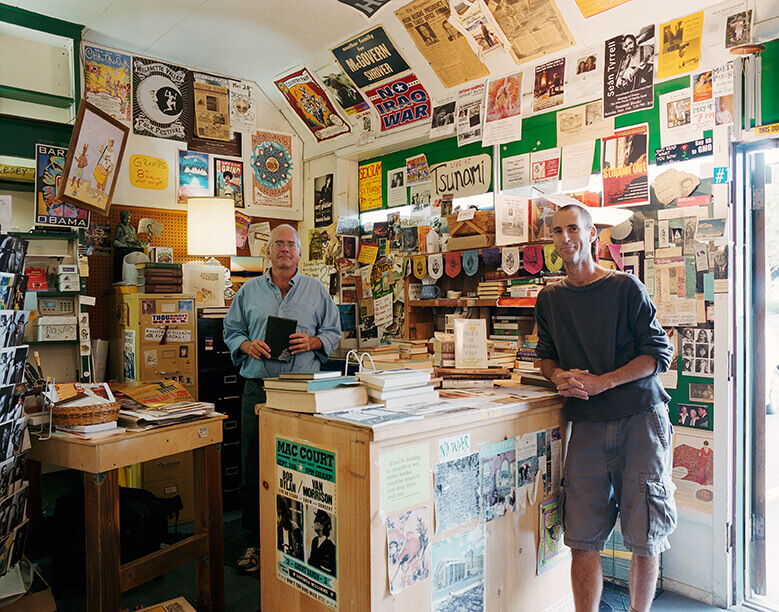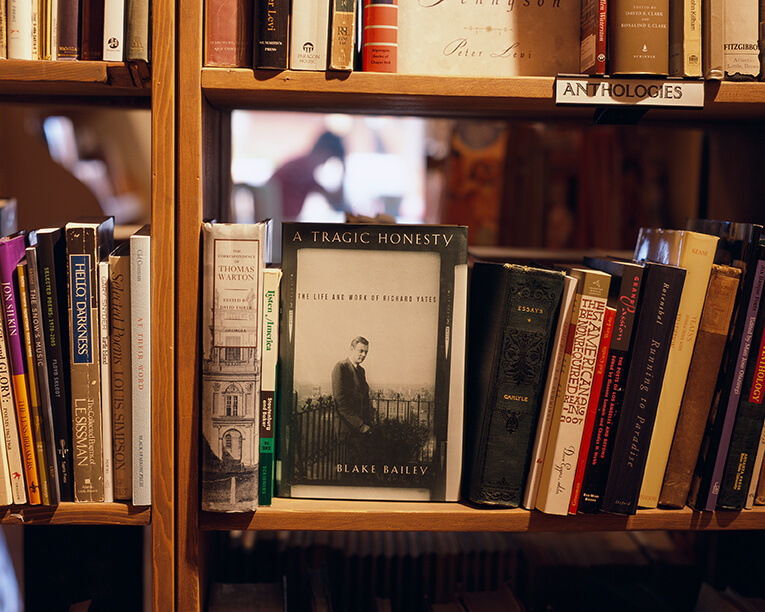I've been watching
Bryan David Griffith's work for years now. Like Bryan, I lug around a view camera and make platinum prints and those were the first images of his that I fell in love with. He had these dream-like images from a series called, In A Big World Wandering. I marveled at the tiny figures in the sublime platinum prints, some in places I recognized, some in the strangest and most surreal settings. The way Bryan used the movements of the large format camera to heighten the dream-like quality of the image...really alluring. I'd been following this work for a while when I ran into Bryan at one of the reviews, and he had a new color project that was about something else near and dear to my heart. Books.
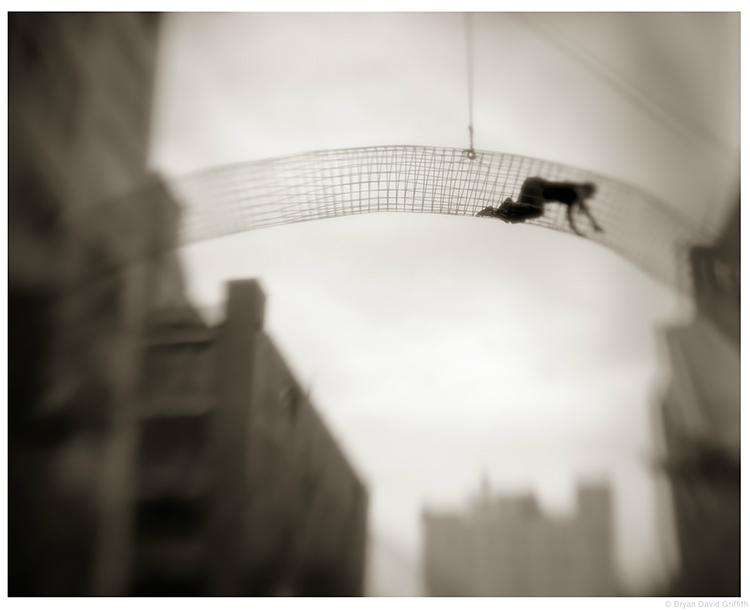
© Bryan David Griffith - In A Big World Wandering
I'm a rabid book collector and when I saw Bryan's image of a person laying on the floor surrounded by rows and rows and rows of towering bookshelves, I thought, Yes, I must go to that place. But there wasn't just that one photograph, it turns out. This new obsession of Bryan's was turning into a larger project,
The Last Bookstores: America's Resurgent Independents.
Bryan claims that he wasn't the best photographer to tackle this project, but felt it was a story that needed to be told, and he was in a place to give it a shot. I say that because my work is mostly idiosyncratic alternative or landscape photography. I have no training or experience in editorial work or portraiture, and use only old-school 4x5 and 6x7 landscape cameras, with no light meters in the camera, let alone autofocus, artificial lighting, etc. When I first started, I thought the project would be more about photographing interiors and storefronts. But the stories were so compelling and the people so passionate, I realized I needed to step out of my comfort zone and find a way to both include people in the photos and write down what I was hearing. So I tried the best I could while camping out on extended road trips for another project-spending the days in the stores interviewing and shooting, and loading film holders in the back of my truck at night.

-- Kevin Ryan, co-owner, Green Apple Books, San Francisco.
Bryan was onto something for certain and has ardently photographed the passionate independent book store owners and their shops across the United States. Now I, and many other bibliophiles, have a guide to unknown treasures and not just a series of compelling photographs to study. If you want to see these great pictures in person, they're on view at the Phoenix Public Library through March 4, 2016. What better place to see an exhibition about books?
During this period of driving his truck from bookstore to bookstore and building on this important series of pictures, a wildfire threatened his film archive. Ironically that led to his accepting a grant to work on an NEA-funded project about wildfire, which led to wielding fire and wandering off the edge of the photography map into conceptual painting, sculpture, and large-scale installation. The traveling exhibition titled Fires of Change is a collaborative project with the Southwest Fire Science Consortium, The Flagstaff Arts Council, and the Landscape Conservation Initiative funded by the National Endowment for the Arts and Joint Fires Sciences Program. This phenomenal exhibition and installation is now on view at the University of Arizona Museum of Art in Tucson until April 3, 2016. As a result of his new work for the project, the Flagstaff Arts Council nominated Bryan for this year's Viola Award for Excellence in the Visual Arts, Flagstaff's most prestigious award for an arts achievement.
Well, there's something to be said for taking risks and leaving your comfort zone. If you're in the Southwest this spring, definitely have a look at this dynamic exhibition. I'm impressed how this accomplished photographer left the calm of the bookstore behind and literally threw himself into the fire. Bravo, Bryan!

Those are the pieces of our history that matter the most to me, now that I'm the generation in charge. But what's compromising that is obviously what's happening to books, and literacy as a larger social, cultural question.
I feel like I have a window to make some good decisions-for our business, for my family, for the people that work for me-to make some of things my parents set out to accomplish continue, because I value those same things, too. It's not enough for me to make, personally, money every year. If in order for me to make money, I have to eliminate health insurance for my employees, then why do this?
-- Evon Smith, co-owner, Smith Family Bookstore, Eugene, Oregon
Story time is just fun. I just pretend like I'm reading to my kid. I have so much fun doing it. I do love music too, so I always try to do musical story times. I've worked in quite a few bookstores, and this is the best one I've ever worked in. Everything is just so carefully curated, much more than Powell's, more than any other place. We have to be, because we're tiny. I don't use this word lightly-it's magical. It's very magical. Children love it. Parents love it. I have never seen anybody unhappy here. It's really a special place. It sounds cliché, but it's true.
-- Andrea Lampman, bookseller, Green Bean Books, Portland, Oregon
One day last year in December, I was working behind the front counter, helping people ringing up sales. At one point I looked up. There was a line of people from the front counter stretched back the entire length of the store to the information desk that was, I'm guessing, 70 people deep standing there with their baskets and their arms full of books. We were not having a sale event. We were not doing any discounts. We did not have the sexiest new game or device or anything like that. They had come because they wanted to buy their books and their gifts from us-and pay the full retail price and stand in line to do that. People understand that if they want to continue to have choices and things that they value available to them, they have to vote with their feet and their wallets.
-- Peter Aaron, owner, Elliott Bay Book Co., Seattle
I'm very influenced by a whole bunch of dead people, and people who spoke languages I don't share, by the magic of the book. This is the only thing that has ideas trapped in it very literally. It's a big deal in my mind-more than just a job, more than just retail. I don't like being called a retailer, and I don't like being called a businessman. I prefer bookseller! In my mind, that's saying you're a purveyor of ideas and dreams and thinking.
-- Tony Weller, co-owner, Weller Book Works, Salt Lake City
The last 10 years have been a huge shakeup. We're a close-knit industry despite the fact that we're competitors, and to see stores go out of business is hard-it's really hard. There were people in the industry who urged Tony and me to not move the store, to simply close it, and take the assets from that business and live very comfortably, which we could have. But I can't be somebody who does nothing. I can't be a lady who lunches. I have to work, and I've pretty much made myself unfit for nearly anything else at this point. I could go back to libraries, but I really love this, and Tony really loves it. It's what we want to keep doing until we can't do it anymore. So it was worth not taking the money and running, and, you know, it was a financial risk. We had to move or die. It was a risk to come here, but it was the right risk to take for us.
-- Catherine Weller co-owner, Weller Book Works, Salt Lake City
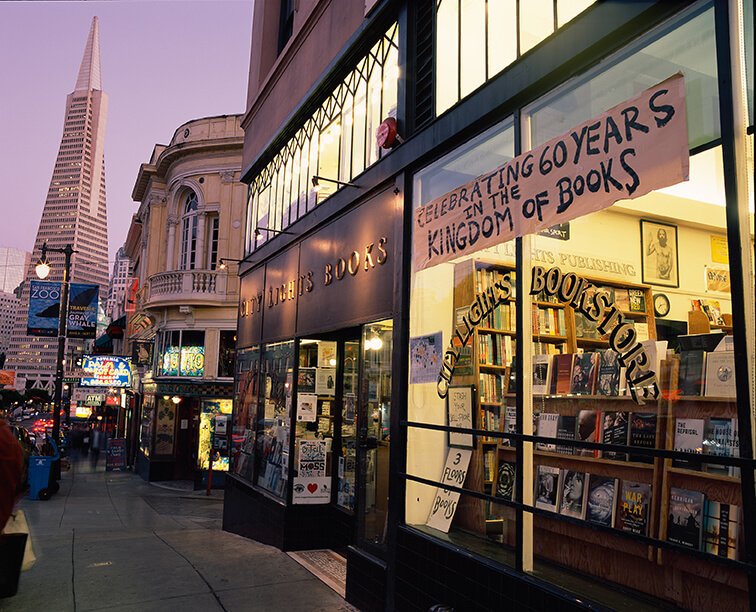
Those who continue to come to the bookstore to find what they need tell me that the answer is an emphatic YES. And since I am one of them, I would like to raise my own din now and joyfully proclaim on the 60th Anniversary of the founding of City Lights: HELL YES, WE'RE STILL HERE, AND WE ARE HERE TO STAY!
-- Elaine Katzenberger, publisher and executive director, City Lights, San Francisco
Our specific job at City Lights is to bring books and writers up from the depths and get a little sunlight on them. ... If it's a book we happen to carry and it gets on a bestseller list, that's great, but it's not something we're looking for when acquiring books. The least compelling thing that you can say to us at City Lights is: we think this book is going to sell well. We want to know: What is this book saying, and how well is it told?
-- Paul Yamazaki, coordinating buyer, City Lights, San Francisco
Biography
Bryan David Griffith is a dynamic artist working in photography, painting, sculpture, and installation. His work is held in several collections including the Museum of Fine Arts Houston, the University of Michigan Museum of Art, the Center for Creative Photography, and the Fort Wayne Museum of Art. He has exhibited extensively in solo and small group shows throughout the U.S., most recently at the Griffin Museum of Photography (Winchester, MA), and the University of Arizona Museum of Art (Tucson). His work has been featured by Slate, Arizona Highways, Photo District News, B&W, and Diffusion. The Flagstaff Arts Council has twice nominated him for its Viola Awards for outstanding achievements in the arts.
Griffith's unconventional career began when he stumbled upon an abandoned, dog-eared copy of Henry Horenstein's Black and White Photography: A Basic Manual and built a makeshift darkroom while studying engineering at the University of Michigan. After graduation he built a successful career with an international management consulting firm, but found his job increasingly unfulfilling and his clients environmentally dubious. He ultimately resigned to follow his conscience. Searching for a way to support himself and pursue photography full-time, he adopted a simple nomadic life, camping out and saving every dime for film and gas while driving across the country to sell his photographs at fine art fairs. This experience led to a personal connection with America's public lands, reflected in his first body of work, Listen to the Wild. When Bryan's van broke down in Flagstaff, Arizona, he fell in love with the mountain town-and then his wife, Tasha Miller Griffith-and has called it home ever since.
Current and upcoming shows:
Fires of Change
University of Arizona Museum of Art Tucson, AZ
Nov 19, 2015 - Apr 3, 2106
Bryan David Griffith: The Last Bookstores
@Central Gallery, Burton Barr Central Library, Phoenix Public Library Phoenix, AZ
Jan 22-Mar 4, 2016
Flagstaff Arts Council Viola Awards (Excellence in the Visual Arts nominee)
Preview at the Orpheum Theater Feb 4, Gala at the High Country Conference Center, Mar 5, 2016
There is a whole new generation of younger people coming into the business being very clear about how challenging this will be ... but have the persistence, the tenacity, and the talent to work in a low-paying field-but one that will reward them immensely. That's the other part: the people in the business are great. I always find it rewarding to go into somebody else's store.
-- Paul Yamazaki, coordinating buyer, City Lights, San Francisco
We started with no money, literally no money: trading, dealing with people, getting things for free, sweat equity-a tremendous amount of sweat equity-and positive energy. Two people, my bookstore partner and I, thought that energy equals capital. That was our theory.
-- Scott Landfield, owner, Tsunami Books, Eugene, Oregon
My kids, when my husband died, they lost him, but they also lost me to some degree-and not because I had the luxury of lying in bed for six weeks and shutting the world out and mourning or whatever. They lost me because the day after his funeral, I was back at work. I had no choice. I had four sets of eyes looking at me going, we're hungry, and what's going on today? Again, where's the line between business and personal? It wasn't like a job I could call in sick to for another couple of weeks, it was my livelihood, and I had major decisions to make. ... If I lose the store, I lose my house, too. There is no line when you own your own business.
-- Sarah Hedrick, owner, Iconoclast Books, Ketchum, Idaho
Our tag line when we do a lot of advertising and support is brothers in arts. Whether you're music, performance, visual, or a bookstore, we partner. And schools: we do every hop-a-thon, read-a-thon, whatever we can donate to. I do a lot of book fair fundraisers for the libraries within the schools. ... I just donated a slumber party in the bookstore for eight kids ... where we will bake, and cook, and listen to music really loud, and play hide and go seek when it gets dark in the bookstore, go to sleep on air mattresses and sleeping bags, and wake up to waffles in the café. If I dry up, if all of the businesses in this town dry up, we also don't have these non-profits. We are all dependent on each other.
-- Sarah Hedrick, owner, Iconoclast Books, Ketchum, Idaho
